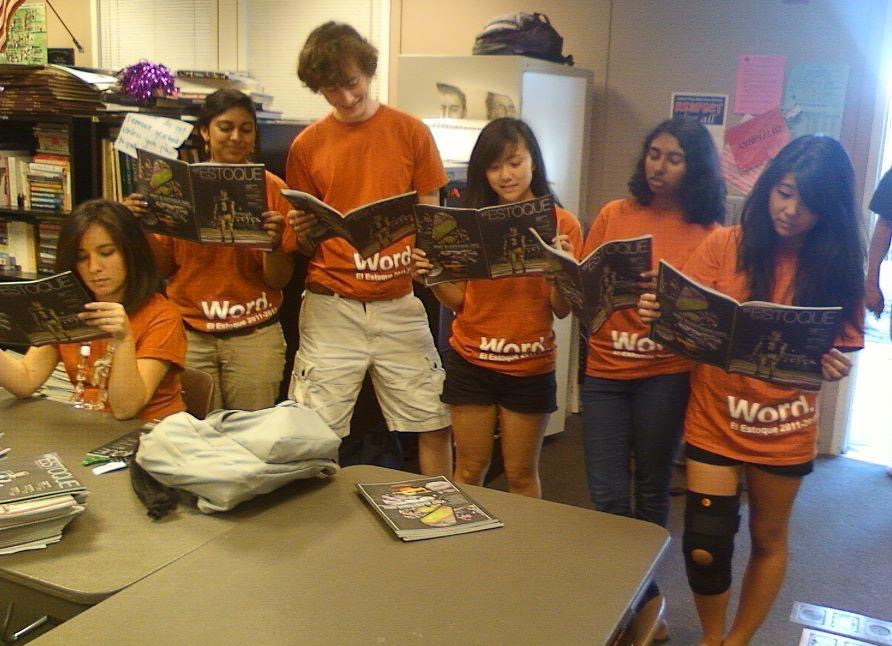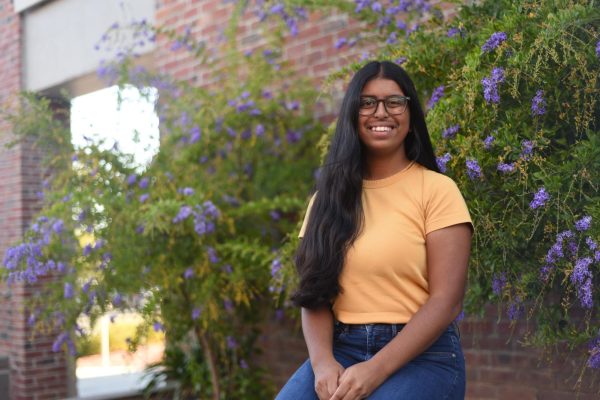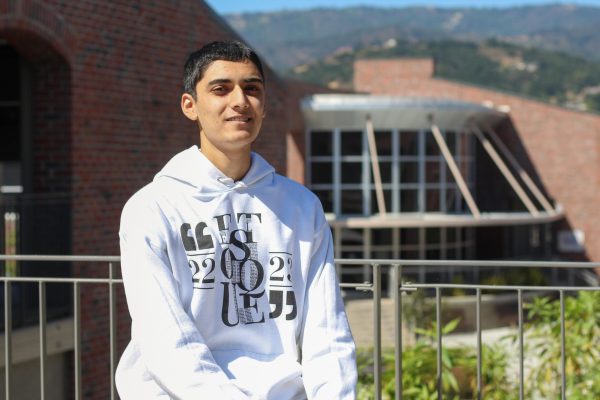When MVHS alum ‘23 and former Editor-in-Chief Anna Jerolimov recalls her memories in El Estoque, one of the first things she remembers is the sense of community she felt with her fellow staff members. Jerolimov says she treasures those close friendships that started from distance learning during the COVID-19 pandemic and lasted through the end of senior year. Now a first-year student at the University of Michigan and a reporter for The Michigan Daily, she notes the numerous life skills El Estoque has equipped her with.
“Being in El Estoque forces you to interact with other people,” Jerolimov said. “When you’re interviewing, you are talking to people of all different backgrounds, people that you wouldn’t necessarily have had a chance to interact with if you weren’t interviewing them. Those are all amazing people skills, and I don’t think that I really would have had a place at MVHS to develop those skills if I wasn’t in El Estoque.”
Former El Estoque adviser Michelle Balmeo, who taught at MVHS from fall 2005 to spring 2016, says she had a similar experience with journalism. She notes that journalism was a special opportunity for her as a high schooler.
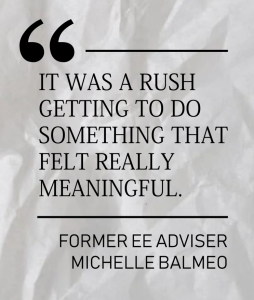 “Out of everything I did in high school, it was the most real,” Balmeo said. “There aren’t a lot of things that kids are allowed to do that have real impact and real consequences. So it was a rush getting to do something that felt really meaningful.”
“Out of everything I did in high school, it was the most real,” Balmeo said. “There aren’t a lot of things that kids are allowed to do that have real impact and real consequences. So it was a rush getting to do something that felt really meaningful.”
Similarly, MVHS alum ‘10 and former Editor-in-Chief Samved Sangameswara also says he enjoyed his experiences in El Estoque. Now a current high school journalism adviser for the Dry Gulch Gazette and The Arroyan yearbook in San Lorenzo, Sangameswara believes that El Estoque opened up a whole new world in journalism for him. He aims to bring similar experiences to his own students, many of whom come from a low-income background.
“As a teacher, community is something I pay a lot of attention to,” Sangameswara said. “El Estoque had such a tight community and I had a lot of real friends that I made there. So where I teach, I try to cultivate a similar experience for my students.”
Growing up, Balmeo also felt the value of a supportive adviser and community. Since her parents had a lower income and did not have the opportunity to pursue higher education until later in life, they encouraged her to go to college but weren’t sure how exactly she could get there. Balmeo credits her journalism adviser Pete LeBlanc with giving her the tools to forge ahead.
“My adviser was the first person, the first adult, who really put me on the path to go to college,” Balmeo said. “My parents always talked about college, but neither of them were college graduates at the time. My mom has since graduated college, but they were both working in entry-level jobs. So for me, journalism was my path to opportunities that got me beyond the economic situation that my parents were in.”
After college, Balmeo’s aspirations shifted from becoming a journalist to becoming a journalism adviser, since she was interested in teaching as well. The first staff she oversaw was El Estoque, and she remembers being impressed by how mature and driven her first editor team was. Balmeo emphasizes that the team had a lot of ownership and responsibility over the publication, and that it turned out to be a “memorable first year.”
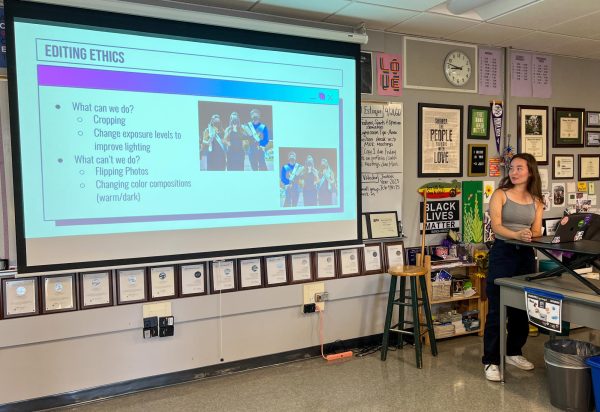
According to Jerolimov, that ownership means editors frequently have to proactively resolve issues to keep the class on track. She distinctly recalls an experience close to the end of her first semester as co-Editor-in-Chief, when she had to do extra planning to ensure that the magazine was submitted on time despite a special bell schedule.
“As Editor-in-Chief there was no set assignment for us to keep track of these things, and you have to always be on the lookout for what the class needs at the time,” Jerolimov said. “You have to anticipate what things can go wrong before they even happen, and I think that took the most energy and the most planning.”
Sangameswara believes this level of responsibility and trust placed in editors facilitates a more professional relationship than students and teachers usually have with each other. He even recalls arguing with Balmeo at a late-night work session over the best headline for a story, now valuing that opportunity as a way to respectfully challenge each other’s opinions.
“There are few opportunities you have in high school to debate or argue with your teacher and have a sense of [being] intellectually equal as adults,” Sangameswara said. “I think that’s a really formative experience to have when you’re 16, 17 or 18 years old. You’re not always just being told what’s right and what’s wrong by adults, even if it’s something silly and small and minor, like a headline about dodgeball.”
Balmeo says these small moments made her time advising El Estoque not just memorable, but unique to the point that she worried she would never have the same experience again. Now a current journalism teacher at West Albany High School in Albany, Oregon, Balmeo notes drastic differences between El Estoque and her current program, where she helped set up the newspaper. Although she later realized that students on every staff she advised had similar goals and interests, it was still hard for her to leave El Estoque.
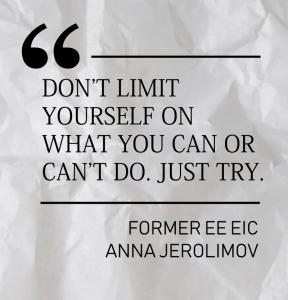 “I felt like those were my kids for so long, and you get rooted in that community,” Balmeo said. “You’re just part of kids’ memories of high school and there’s a whole alumni network that builds because of the connectedness between the generations and the overlap. There aren’t a lot of classes that have different generations crossing over each other. I felt very attached to the program because it really did feel like we had changed so much over the years we rolled through.”
“I felt like those were my kids for so long, and you get rooted in that community,” Balmeo said. “You’re just part of kids’ memories of high school and there’s a whole alumni network that builds because of the connectedness between the generations and the overlap. There aren’t a lot of classes that have different generations crossing over each other. I felt very attached to the program because it really did feel like we had changed so much over the years we rolled through.”
Balmeo adds that those changes wouldn’t have been as smooth or even possible without the students who took initiative to build El Estoque’s first website, design the first magazine and generally break from tradition to create something new. In this way, Jerolimov believes that current El Estoque members should look past their own abilities and try to push their own limits.
“If you don’t take that leap the first time and you don’t try something, you’re not going to get any better at it,” Jerolimov said. “By the time I wrote a column, I wished that I had done it earlier, and I feel like that applies to a lot of different things that you can do on staff. So to all people on staff, don’t limit yourself on what you think you can or can’t do. Just try.”




